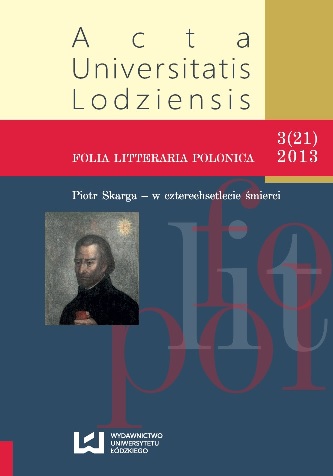The Structure and Problems of the Triumphal Sermons of Piotr Skarga Preached on the Occasion of Victories of War
DOI:
https://doi.org/10.18778/1505-9057.21.12Keywords:
Piotr Skarga, triumphal sermon, preaching, rhetoric, Polish literatureAbstract
The paper is to reconstruct the structure and presentation of the issues of Piotr Skarga’s sermons for giving thanks for victory in war. The Royal Preacher preached the following orations: after the victory of Byczyna by Jan Zamoyski in 1588 over Maximilian Habsburg (not printed); after the victory of The Army of John Charles Chodkiewicza of Kircholm over The Army of Charles, Prince of Sudermania in 1605; after the victory of Jan Zamoyski over the Michael the Brave (Mihai Viteazul) in 1600 and after the capture of Smolensk in 1611 by The Army of Sigismund III Vasa. Orations are made up of motto, exordium, narratio, propositio, argumentatio, part of instructive and conclusio.
The paper presents the design of the title, brings the functions of motto; characterized has varied topics of introductions depending on the military situation. Posing the thesis, Skarga spoke about thanksgiving for God’s mercy, about the joy of victory, and regret over the death and suffering of soldiers, and finally about the benefits brought about by military victory. In narratio Skarga presented generally unfavorable circumstances associated with internal victory. The giving of proper thanks as arguments with the enumeration of gifts which received from God to the state and its citizens which Skarga put in argumentatio. He used the topic of exhortation, called to give thanks to God, the army and its commanders. Additionally, Skarga introduced the lecture containing a moral instruction. He condemned the attitude undesirable, calling for penance. In conclusio Skarga invited to worship the holy patrons: Stanislaus, Hedwig, and Wojciech. He expected to fund churches, set up monasteries as a form of thanksgiving.
Skarga was reaching for The Bible not only in mottos, but also by building argumentatio. He compared the situation of human figures from Old Testament with the location of the commanders of the army and throughout the Commonwealth. He did not however, attribute the nobility of the state and their messianic role in history.
Downloads
Downloads
Published
How to Cite
Issue
Section
License

This work is licensed under a Creative Commons Attribution-NonCommercial-NoDerivatives 4.0 International License.











